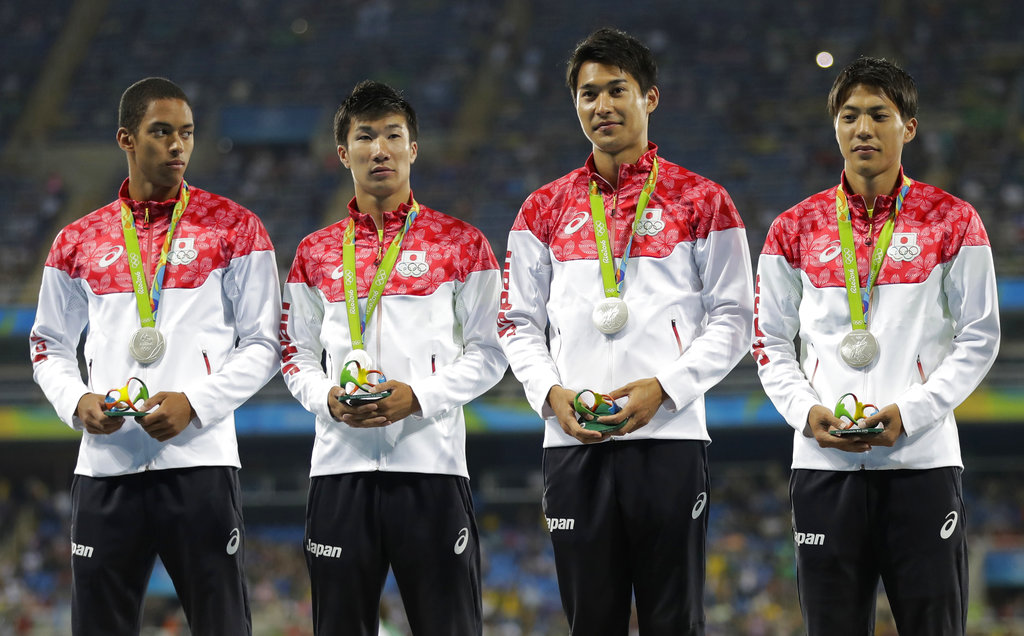
FILE – In this Aug. 19, 2016, file photo, Japan’s Ryota Yamagata, Shota Iizuka, Yoshihide Kiryu and Aska Cambridge celebrate on the podium after winning the silver medal in the men’s 4 x 100-meter relay during the athletics competitions of the 2016 Summer Olympics at the Olympic stadium in Rio de Janeiro, Brazil. With the Tokyo Olympics less than two years away, Japanese athletes will be using the Asian Games to build confidence as they prepare to host the world on sport’s biggest stage. (AP Photo/Jae C. Hong, File)
TOKYO — With the Tokyo Olympics less than two years away, Japanese athletes will be using the Asian Games to build confidence as they prepare to host the world on sport’s biggest stage.
The Japanese Olympic Committee has set an ambitious target of 30 gold medals for the 2020 Olympics, almost double the national record.
The most gold medals Japan has won at the Summer Olympics is 16 — in 1964 at Tokyo and in 2004 at Athens. At the Rio de Janeiro Olympics in 2016, Japan claimed the sixth-highest number of gold medals with 12.
The Asian Games, being held Aug. 18 to Sept. 2 in the Indonesian cities of Jakarta and Palembang, are an important stepping stone.
While Japan can always count on medals in traditional Japanese sports such as judo and karate, the Asian Games will give the country a chance to gauge preparations in sports they haven’t always dominated.
Nowhere is this more evident than in athletics where Japan’s 4×100-meter relay team has set its sights on the gold medal at Tokyo in 2020.
Considering the team of Yoshihide Kiryu, Aska Cambridge, Shota Iizuka and Ryota Yamagata won the silver medal at the Rio Olympics, that’s no longer a far-fetched dream. At the Asian Games, they’ll face a stern challenge from China’s 4×100 relay, silver medalists at the 2015 world championships and another Olympic medal contender.
“We’re aiming for the gold medal in Indonesia,” Yamagata said at a recent training camp. “We want to use the Asian Games to build confidence toward next year’s world championships and the Olympics in 2020.”
Cambridge, whose father is Jamaican and mother is Japanese, competes in both the 100- and 200-meter sprints as well and is one of the rising stars in Japanese athletics.
“We can feel the excitement building,” Cambridge said. “There are a lot of runners in the 100 (at the Asian Games) who can run under 10 seconds so I expect it will be a very tough race.”
Five new sports have been added to the program for Tokyo 2020, and the Asian Games will feature several of those.
Japan has established itself as a global powerhouse in bouldering, one of three disciplines in sport climbing, and will be aiming to dominate the event in Indonesia.
Baseball and softball are also returning to the Olympic program in Tokyo and, while Japan has always been a medal contender, the Asian Games will provide a good test run after a long absence from international competition.
Baseball and softball haven’t been contested in the Olympics since Beijing in 2008 and Japan is hoping to take home the gold medal in both events in two years’ time.
Another area where Japan is expecting an impressive medal haul is in the pool.
Kosuke Hagino and teenage star Rikako Ikee are among 22 swimmers going to Indonesia for Japan.
Hagino collected four gold medals and was awarded the MVP award at the 2014 edition of the Asian Games in Incheon, South Korea.
The 18-year-old Ikee competed in seven disciplines, including relays, at the Rio Olympics. She is the junior world record holder in the 50-meter freestyle and 50-meter butterfly long-course events.
Japan placed third overall at the 2014 Asian Games behind China and South Korea and is aiming to increase its medal haul from Incheon to Indonesia.